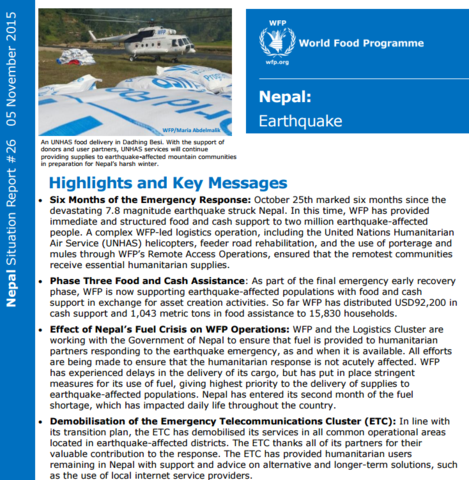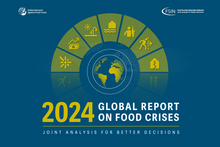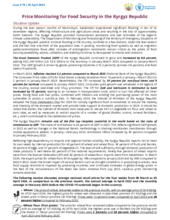
Highlights
- Six Months of the Emergency Response: October 25th marked six months since the devastating 7.8 magnitude earthquake struck Nepal. In this time, WFP has provided immediate and structured food and cash support to two million earthquake-affected people. A complex WFP-led logistics operation, including the United Nations Humanitarian Air Service (UNHAS) helicopters, feeder road rehabilitation, and the use of porterage and mules through WFP’s Remote Access Operations, ensured that the remotest communities receive essential humanitarian supplies.
- Phase Three Food and Cash Assistance: As part of the final emergency early recovery phase, WFP is now supporting earthquake-affected populations with food and cash support in exchange for asset creation activities. So far WFP has distributed USD92,200 in cash support and 1,043 metric tons in food assistance to 15,830 households.
- Effect of Nepal’s Fuel Crisis on WFP Operations: WFP and the Logistics Cluster are working with the Government of Nepal to ensure that fuel is provided to humanitarian partners responding to the earthquake emergency, as and when it is available. All efforts are being made to ensure that the humanitarian response is not acutely affected. WFP has experienced delays in the delivery of its cargo, but has put in place stringent measures for its use of fuel, giving highest priority to the delivery of supplies to earthquake-affected populations. Nepal has entered its second month of the fuel shortage, which has impacted daily life throughout the country.
- Demobilisation of the Emergency Telecommunications Cluster (ETC): In line with its transition plan, the ETC has demobilised its services in all common operational areas located in earthquake-affected districts. The ETC thanks all of its partners for their valuable contribution to the response. The ETC has provided humanitarian users remaining in Nepal with support and advice on alternative and longer-term solutions, such as the use of local internet service providers.
- Funding for WFP’s Earthquake Response: WFP has received contributions from its private sector donors, multilateral donors, Australia, Canada, Denmark, European Union, Germany, Ireland, Japan, Liechtenstein, the Netherlands, Norway, Sweden, Switzerland, United Kingdom, United States and UN CERF.
| Document | File |
|---|---|
| WFP NEPAL EARTHQUAKE SITUATION REPORT #26, 05 NOVEMBER 2015 |
PDF | 724.69 KB
Download
|


